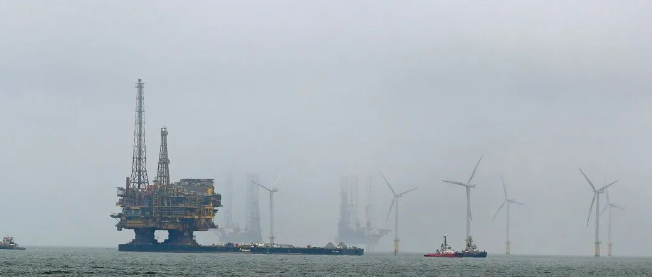Recently, the Dutch government website announced that the Netherlands and Germany will jointly drill a new gas field in the North Sea region, which is expected to produce the first batch of natural gas by the end of 2024. This is the first time that the German government has reversed its stance since the government of Lower Saxony last year expressed its opposition to gas exploration in the North Sea. Not only that, but recently, Germany, Denmark, Norway and other countries have also revealed plans to build a combined offshore wind power grid. European countries are constantly “holding together” to deal with the intensifying energy supply crisis.

Multinational cooperation to develop the North Sea
According to the news released by the Dutch government, the natural gas resources developed in cooperation with Germany are located in the border area between the two countries. The two countries will jointly build a pipeline to transport the natural gas produced by the gas field to the two countries. At the same time, the two sides will also lay submarine cables to connect the nearby German offshore wind farm to provide electricity for the gas field. The Netherlands said that it has issued a license for the natural gas project, and the German government is accelerating the approval of the project.
It is understood that on May 31 this year, the Netherlands was cut off by Russia for refusing to settle natural gas payments in rubles. Industry analysts believe that the above-mentioned measures in the Netherlands are in response to this crisis.
At the same time, the offshore wind power industry in the North Sea region has also ushered in new opportunities. According to Reuters, European countries including Germany, Denmark, Belgium and other countries have all said recently that they will promote the development of offshore wind power in the North Sea and intend to build cross-border combined power grids. Reuters quoted the Danish grid company Energinet as saying that the company is already in talks with Germany and Belgium to promote the construction of power grids between energy islands in the North Sea. At the same time, Norway, the Netherlands and Germany have also started planning other power transmission projects.
Chris Peeters, CEO of Belgian grid operator Elia, said: “Building a combined grid in the North Sea can save costs and solve the problem of fluctuations in power production in different regions. Taking offshore wind power as an example, the application of combined grids will help operations. Businesses can better allocate electricity and deliver electricity produced in the North Sea to nearby countries quickly and in a timely manner.”
Europe’s energy supply crisis intensifies
The reason why European countries have frequently “grouped together” recently is mainly to deal with the tense energy supply that has lasted for several months and the increasingly serious economic inflation. According to the latest statistics released by the European Union, as of the end of May, the inflation rate in the euro zone has reached 8.1%, the highest level since 1997. Among them, the energy cost of EU countries even increased by 39.2% compared with the same period last year.
In mid-May this year, the European Union formally proposed the “REPowerEU energy plan” with the main purpose of getting rid of Russian energy. According to the plan, the EU will continue to promote the diversification of energy supply, encourage the application of energy-saving technologies, and accelerate the growth of renewable energy installations and accelerate the replacement of fossil fuels. By 2027, the EU will completely get rid of imports of natural gas and coal from Russia, at the same time increase the share of renewable energy in the energy mix from 40% to 45% in 2030, and accelerate investment in renewable energy by 2027 An additional investment of at least 210 billion euros will be made annually to ensure the energy security of EU countries.
In May of this year, the Netherlands, Denmark, Germany and Belgium also jointly announced the latest offshore wind power plan. These four countries will build at least 150 million kilowatts of offshore wind power by 2050, which is more than 10 times the current installed capacity, and the total investment is expected to exceed 135 billion euros.
Energy self-sufficiency is a huge challenge
However, Reuters pointed out that although European countries are currently working hard to strengthen energy cooperation, they still face challenges in financing and supervision before the actual implementation of the project.
It is understood that at present, offshore wind farms in European countries generally use point-to-point cables to transmit power. If a combined power grid connecting each offshore wind farm is to be built, it is necessary to consider each power generation terminal and transmit the power to two or more power markets, regardless of whether It’s more complicated to design or build.
On the one hand, the construction cost of transnational transmission lines is high. Reuters quoted professionals as saying that it will take at least 10 years to build a cross-border interconnected power grid, and the construction cost may exceed billions of dollars. On the other hand, there are many European countries involved in the North Sea region, and non-EU countries such as the United Kingdom are also interested in joining the cooperation. Ultimately, how to supervise the construction and operation of related projects and how to distribute the income will also be a major problem.
In fact, there is currently only one transnational combined grid in Europe, which connects and transmits electricity to several offshore wind farms in Denmark and Germany on the Baltic Sea.
In addition, the approval issues plaguing the development of renewable energy in Europe have not yet been resolved. Although European wind energy industry organizations have repeatedly suggested to the EU that if the established renewable energy installation target is to be achieved, European governments should significantly reduce the time required for project approval and simplify the approval process. However, the development of renewable energy projects still faces many restrictions due to the strict ecological diversification protection policy formulated by the EU.
Post time: Jun-14-2022
